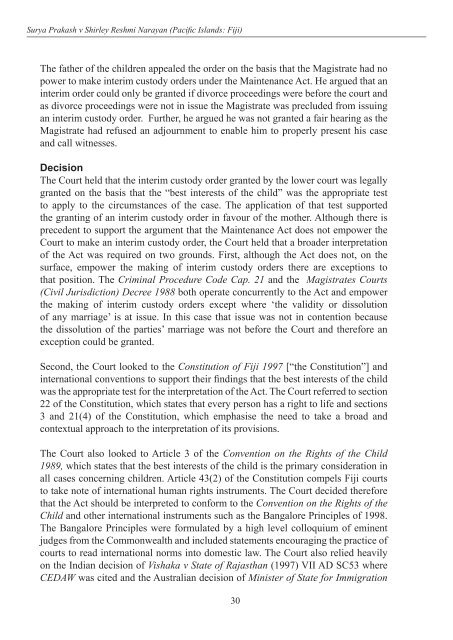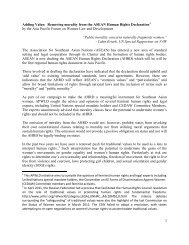A Digest of Case Law on the Human Rights of Women - Asia Pacific ...
A Digest of Case Law on the Human Rights of Women - Asia Pacific ...
A Digest of Case Law on the Human Rights of Women - Asia Pacific ...
Create successful ePaper yourself
Turn your PDF publications into a flip-book with our unique Google optimized e-Paper software.
Surya Prakash v Shirley Reshmi Narayan (<strong>Pacific</strong> Islands: Fiji)<br />
The fa<strong>the</strong>r <str<strong>on</strong>g>of</str<strong>on</strong>g> <strong>the</strong> children appealed <strong>the</strong> order <strong>on</strong> <strong>the</strong> basis that <strong>the</strong> Magistrate had no<br />
power to make interim custody orders under <strong>the</strong> Maintenance Act. He argued that an<br />
interim order could <strong>on</strong>ly be granted if divorce proceedings were before <strong>the</strong> court and<br />
as divorce proceedings were not in issue <strong>the</strong> Magistrate was precluded from issuing<br />
an interim custody order. Fur<strong>the</strong>r, he argued he was not granted a fair hearing as <strong>the</strong><br />
Magistrate had refused an adjournment to enable him to properly present his case<br />
and call witnesses.<br />
Decisi<strong>on</strong><br />
The Court held that <strong>the</strong> interim custody order granted by <strong>the</strong> lower court was legally<br />
granted <strong>on</strong> <strong>the</strong> basis that <strong>the</strong> “best interests <str<strong>on</strong>g>of</str<strong>on</strong>g> <strong>the</strong> child” was <strong>the</strong> appropriate test<br />
to apply to <strong>the</strong> circumstances <str<strong>on</strong>g>of</str<strong>on</strong>g> <strong>the</strong> case. The applicati<strong>on</strong> <str<strong>on</strong>g>of</str<strong>on</strong>g> that test supported<br />
<strong>the</strong> granting <str<strong>on</strong>g>of</str<strong>on</strong>g> an interim custody order in favour <str<strong>on</strong>g>of</str<strong>on</strong>g> <strong>the</strong> mo<strong>the</strong>r. Although <strong>the</strong>re is<br />
precedent to support <strong>the</strong> argument that <strong>the</strong> Maintenance Act does not empower <strong>the</strong><br />
Court to make an interim custody order, <strong>the</strong> Court held that a broader interpretati<strong>on</strong><br />
<str<strong>on</strong>g>of</str<strong>on</strong>g> <strong>the</strong> Act was required <strong>on</strong> two grounds. First, although <strong>the</strong> Act does not, <strong>on</strong> <strong>the</strong><br />
surface, empower <strong>the</strong> making <str<strong>on</strong>g>of</str<strong>on</strong>g> interim custody orders <strong>the</strong>re are excepti<strong>on</strong>s to<br />
that positi<strong>on</strong>. The Criminal Procedure Code Cap. 21 and <strong>the</strong> Magistrates Courts<br />
(Civil Jurisdicti<strong>on</strong>) Decree 1988 both operate c<strong>on</strong>currently to <strong>the</strong> Act and empower<br />
<strong>the</strong> making <str<strong>on</strong>g>of</str<strong>on</strong>g> interim custody orders except where ‘<strong>the</strong> validity or dissoluti<strong>on</strong><br />
<str<strong>on</strong>g>of</str<strong>on</strong>g> any marriage’ is at issue. In this case that issue was not in c<strong>on</strong>tenti<strong>on</strong> because<br />
<strong>the</strong> dissoluti<strong>on</strong> <str<strong>on</strong>g>of</str<strong>on</strong>g> <strong>the</strong> parties’ marriage was not before <strong>the</strong> Court and <strong>the</strong>refore an<br />
excepti<strong>on</strong> could be granted.<br />
Sec<strong>on</strong>d, <strong>the</strong> Court looked to <strong>the</strong> C<strong>on</strong>stituti<strong>on</strong> <str<strong>on</strong>g>of</str<strong>on</strong>g> Fiji 1997 [“<strong>the</strong> C<strong>on</strong>stituti<strong>on</strong>”] and<br />
internati<strong>on</strong>al c<strong>on</strong>venti<strong>on</strong>s to support <strong>the</strong>ir findings that <strong>the</strong> best interests <str<strong>on</strong>g>of</str<strong>on</strong>g> <strong>the</strong> child<br />
was <strong>the</strong> appropriate test for <strong>the</strong> interpretati<strong>on</strong> <str<strong>on</strong>g>of</str<strong>on</strong>g> <strong>the</strong> Act. The Court referred to secti<strong>on</strong><br />
22 <str<strong>on</strong>g>of</str<strong>on</strong>g> <strong>the</strong> C<strong>on</strong>stituti<strong>on</strong>, which states that every pers<strong>on</strong> has a right to life and secti<strong>on</strong>s<br />
3 and 21(4) <str<strong>on</strong>g>of</str<strong>on</strong>g> <strong>the</strong> C<strong>on</strong>stituti<strong>on</strong>, which emphasise <strong>the</strong> need to take a broad and<br />
c<strong>on</strong>textual approach to <strong>the</strong> interpretati<strong>on</strong> <str<strong>on</strong>g>of</str<strong>on</strong>g> its provisi<strong>on</strong>s.<br />
The Court also looked to Article 3 <str<strong>on</strong>g>of</str<strong>on</strong>g> <strong>the</strong> C<strong>on</strong>venti<strong>on</strong> <strong>on</strong> <strong>the</strong> <strong>Rights</strong> <str<strong>on</strong>g>of</str<strong>on</strong>g> <strong>the</strong> Child<br />
1989, which states that <strong>the</strong> best interests <str<strong>on</strong>g>of</str<strong>on</strong>g> <strong>the</strong> child is <strong>the</strong> primary c<strong>on</strong>siderati<strong>on</strong> in<br />
all cases c<strong>on</strong>cerning children. Article 43(2) <str<strong>on</strong>g>of</str<strong>on</strong>g> <strong>the</strong> C<strong>on</strong>stituti<strong>on</strong> compels Fiji courts<br />
to take note <str<strong>on</strong>g>of</str<strong>on</strong>g> internati<strong>on</strong>al human rights instruments. The Court decided <strong>the</strong>refore<br />
that <strong>the</strong> Act should be interpreted to c<strong>on</strong>form to <strong>the</strong> C<strong>on</strong>venti<strong>on</strong> <strong>on</strong> <strong>the</strong> <strong>Rights</strong> <str<strong>on</strong>g>of</str<strong>on</strong>g> <strong>the</strong><br />
Child and o<strong>the</strong>r internati<strong>on</strong>al instruments such as <strong>the</strong> Bangalore Principles <str<strong>on</strong>g>of</str<strong>on</strong>g> 1998.<br />
The Bangalore Principles were formulated by a high level colloquium <str<strong>on</strong>g>of</str<strong>on</strong>g> eminent<br />
judges from <strong>the</strong> Comm<strong>on</strong>wealth and included statements encouraging <strong>the</strong> practice <str<strong>on</strong>g>of</str<strong>on</strong>g><br />
courts to read internati<strong>on</strong>al norms into domestic law. The Court also relied heavily<br />
<strong>on</strong> <strong>the</strong> Indian decisi<strong>on</strong> <str<strong>on</strong>g>of</str<strong>on</strong>g> Vishaka v State <str<strong>on</strong>g>of</str<strong>on</strong>g> Rajasthan (1997) VII AD SC53 where<br />
CEDAW was cited and <strong>the</strong> Australian decisi<strong>on</strong> <str<strong>on</strong>g>of</str<strong>on</strong>g> Minister <str<strong>on</strong>g>of</str<strong>on</strong>g> State for Immigrati<strong>on</strong><br />
30



